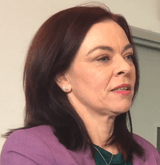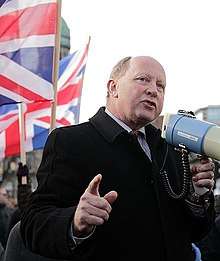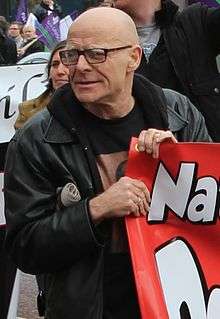2019 Northern Ireland local elections
Local elections were held in Northern Ireland on Thursday 2 May 2019. The last elections were held in 2014. 819 candidates contested 462 seats across Northern Ireland's 11 local government districts.[1] 1,305,384 people aged 18 and over were eligible to vote, and 52.7% of the electorate turned out.[2]
| |||||||||||||||||||||||||||||||||||||||||||||||||||||||||||||||||||||||||||||||||
All 11 districts, 462 council seats | |||||||||||||||||||||||||||||||||||||||||||||||||||||||||||||||||||||||||||||||||
|---|---|---|---|---|---|---|---|---|---|---|---|---|---|---|---|---|---|---|---|---|---|---|---|---|---|---|---|---|---|---|---|---|---|---|---|---|---|---|---|---|---|---|---|---|---|---|---|---|---|---|---|---|---|---|---|---|---|---|---|---|---|---|---|---|---|---|---|---|---|---|---|---|---|---|---|---|---|---|---|---|---|
| |||||||||||||||||||||||||||||||||||||||||||||||||||||||||||||||||||||||||||||||||
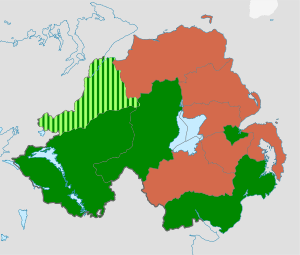 | |||||||||||||||||||||||||||||||||||||||||||||||||||||||||||||||||||||||||||||||||
Electoral system
Northern Ireland uses the Single Transferable Vote (STV) system to elect members of local councils and members of the Northern Ireland Assembly. Voters rank candidates in order of preference by marking 1, 2, 3, etc. to the names of candidates on a ballot paper and can rank as many or as few candidates as they like or just vote for one candidate.[3] These were the second elections held on new boundaries, introduced in 2014.
These were the first Northern Ireland elections at which people have been able to register to vote online.[4]
Background
The Northern Ireland Assembly has been suspended since 2017 with the failure of powersharing between the DUP and Sinn Féin. However, in March 2019, the Secretary of State for Northern Ireland Karen Bradley stated that, after the local elections, the government wished to revive Assembly talks.[5] At the 2017 United Kingdom general election, no party won an overall majority in the UK Parliament, so the DUP agreed a deal to support a minority Conservative government. UK politics was dominated by Brexit, which was due to take place before the local elections, but has been thrice delayed, now until possibly 31 January 2020.
All the parties with elected councillors from the last elections are running again, including the major parties of the Democratic Unionist Party (DUP), Sinn Féin, Ulster Unionist Party (UUP), Social Democratic and Labour Party (SDLP) and Alliance Party of Northern Ireland. The SDLP and Fianna Fáil held talks about running a joint campaign for the May 2019 local elections, with the possibility of the SDLP merging into Fianna Fáil.[6][7] There was division within the membership of the SDLP as to what form of relationship to have between the two parties.[8] The two parties announced a partnership agreement in January 2019 rather than a full merger.[9] In February 2019, both party leaders criticised the DUP and Sinn Féin over the continuing deadlock over power sharing in the Assembly.[10][11]
Aontú is a new party, an anti-abortion splinter from Sinn Féin, launched in January 2019. By February 2019, it had two councillors in Northern Ireland, one defecting from the SDLP and a second from Sinn Féin.[12][13] The party nominated 16 candidates across 7 of the 11 local councils.[14]
Candidates
819 candidates stood, compared to 905 at the previous elections. The DUP fielded 172, Sinn Fein 155, the UUP 117, the SDLP 85 and Alliance 84.[4] Others standing include the Green Party of Northern Ireland, TUV, People Before Profit Alliance, The Workers Party, Progressive Unionist Party, Cross-Community Labour Alternative, Aontú, NI Conservatives,[15] UKIP and several independents.
Results
Paralleling results in England, Alliance, some smaller parties and independents made significant gains.[16] The largest nationalist party, Sinn Féin, returned the same number of councillors as in 2014. The DUP, UUP and SDLP all saw losses. The TUV saw significant losses and UKIP and NI21 lost all of their seats in the region, while Aontú and Cross-Community Labour Alternative won their first seats and there were gains by PPBA and the Greens.[17]
Councils
Local government in Northern Ireland
| Council | Seats | Turnout[2] | Largest party prior to election | Largest party post election | ||
|---|---|---|---|---|---|---|
| Belfast[18] | 60 | 51.0 | Sinn Féin (19) | Sinn Féin (18) | ||
| Ards & North Down[19] | 40 | 43.6 | DUP (17) | DUP (14) | ||
| Antrim & Newtownabbey[20] | 40 | 49.1 | DUP (15) | DUP (14) | ||
| Lisburn & Castlereagh[21] | 40 | 49.7 | DUP (20) | DUP (15) | ||
| Newry, Mourne & Down[22] | 41 | 56.1 | Sinn Féin (14) | Sinn Féin (16) | ||
| SDLP (14) | ||||||
| Armagh, Banbridge & Craigavon[23] | 41 | 53.6 | DUP (13) | DUP (11) | ||
| Mid & East Antrim[24] | 40 | 48.1 | DUP (16) | DUP (15) | ||
| Causeway Coast & Glens[25] | 40 | 51.8 | DUP (11) | DUP (14) | ||
| Mid Ulster[26] | 40 | 60.1 | Sinn Féin (18) | Sinn Féin (17) | ||
| Derry & Strabane[27] | 40 | 57.2 | Sinn Féin (16) | Sinn Féin (11) | ||
| SDLP (11) | ||||||
| Fermanagh & Omagh[28] | 40 | 62.4 | Sinn Féin (17) | Sinn Féin (15) | ||
| All eleven councils | 462 | 52.7 | DUP (130) | DUP (122) | ||
| Name | DUP | SF | UUP | SDLP | APNI | Green | TUV | PBP | PUP | Aontú | CCLA | Ind. | Total |
| Antrim & Newtownabbey | 14 | 5 | 9 | 4 | 7 | 0 | 0 | 0 | 0 | 0 | 0 | 1 | 40 |
| North Down & Ards | 14 | 0 | 8 | 1 | 10 | 3 | 1 | 0 | 0 | 0 | 0 | 3 | 40 |
| Armagh, Banbridge & Craigavon | 11 | 10 | 10 | 6 | 3 | 0 | 0 | 0 | 0 | 0 | 0 | 1 | 41 |
| Belfast City | 15 | 18 | 2 | 6 | 10 | 4 | 0 | 3 | 2 | 0 | 0 | 0 | 60 |
| Causeway Coast & Glens | 14 | 9 | 7 | 6 | 2 | 0 | 0 | 0 | 1 | 0 | 0 | 1 | 40 |
| Derry & Strabane | 7 | 11 | 2 | 11 | 2 | 0 | 0 | 2 | 0 | 1 | 0 | 4 | 40 |
| Fermanagh & Omagh | 5 | 15 | 9 | 5 | 1 | 0 | 0 | 0 | 0 | 0 | 1 | 4 | 40 |
| Lisburn & Castlereagh | 15 | 2 | 11 | 2 | 9 | 1 | 0 | 0 | 0 | 0 | 0 | 0 | 40 |
| Mid & East Antrim | 15 | 2 | 7 | 1 | 7 | 0 | 5 | 0 | 0 | 0 | 0 | 3 | 40 |
| Mid-Ulster | 9 | 17 | 6 | 6 | 0 | 0 | 0 | 0 | 0 | 0 | 0 | 2 | 40 |
| Newry, Mourne & Down | 3 | 16 | 4 | 11 | 2 | 0 | 0 | 0 | 0 | 0 | 0 | 5 | 41 |
| All eleven councils | 122 | 105 | 75 | 59 | 53 | 8 | 6 | 5 | 3 | 1 | 1 | 24 | 462 |
Results by party
| Party | Councillors | % of councillors | First preference votes | % of FP votes | |||||||||
|---|---|---|---|---|---|---|---|---|---|---|---|---|---|
| 2014 | 2019 | +/- | 2014 | 2019 | +/- | 2014[29] | 2019[30] | +/- | 2014 | 2019 | +/- | ||
| DUP | 130 | 122 | 28.1% | 26.4% | 144,928 | 163,615 | 23.1% | 24.13% | |||||
| Sinn Féin | 105 | 105 | 22.7% | 22.7% | 151,137 | 157,448 | 24.1% | 23.22% | |||||
| UUP | 88 | 75 | 19.0% | 16.2% | 101,385 | 95,320 | 16.1% | 14.06% | |||||
| SDLP | 66 | 59 | 14.2% | 12.8% | 85,237 | 81,419 | 13.6% | 12.01% | |||||
| Alliance | 32 | 53 | 6.9% | 11.5% | 41,769 | 78,052 | 6.7% | 11.51% | |||||
| Independent | 18 | 24 | 3.2% | 5.2% | 26,682 | 29,339 | 4.2% | 4.33% | |||||
| Green (NI) | 4 | 8 | 0.8% | 1.7% | 5,515 | 14,284 | 0.8% | 2.11% | |||||
| TUV | 13 | 6 | 2.8% | 1.3% | 28,310 | 15,165 | 4.5% | 2.24% | |||||
| People Before Profit | 1 | 5 | 0.2% | 1.2% | 1,923 | 9,478 | 0.3% | 1.40% | |||||
| PUP | 4 | 3 | 0.8% | 0.6% | 12,753 | 5,338 | 2.0% | 0.79% | |||||
| Aontú | n/a | 1 | n/a | 0.2% | n/a | 7,459 | n/a | 1.10% | |||||
| Labour Alternative | n/a | 1 | n/a | 0.2% | n/a | 880 | n/a | ||||||
| UKIP | 3 | 0 | 1.2% | 0.0% | 9,311 | 3,026 | 1.4% | 0.45% | |||||
| NI Conservatives | 1 | 0 | 0.0% | 0.0% | 2,527 | 1,364 | 0.4% | 0.20% | |||||
| Workers' Party | 0 | 0 | 0.0% | 0.0% | 985 | 868 | 0.2% | ||||||
| Democrats and Veterans | n/a | 0 | n/a | 0.0% | n/a | 527 | n/a | ||||||
| South Belfast Unionists | n/a | 0 | n/a | 0.0% | n/a | 233 | n/a | ||||||
| CISTA | n/a | 0 | n/a | 0.0% | n/a | 101 | n/a | ||||||
| NI21 | 1 | n/a | 0.2% | n/a | 11,495 | n/a | 1.8% | n/a | |||||
| Total | 462 | 462 | 100% | 100% | 628,078 | 663,916 | 100% | 100% | |||||
Footnotes
- The leader of Sinn Féin is Mary Lou McDonald, who sits as a TD in the Irish Dáil Éireann for Dublin Central. O'Neill is the leader of the party in Northern Ireland.
See also
References
- "Council elections: What you need to know". BBC News. 1 May 2019. Retrieved 5 May 2019.
- "Local Council Election Results". Electoral Office for Northern Ireland. Retrieved 5 May 2019.
- "Voting systems in Northern Ireland". Electoral Office for Northern Ireland. Retrieved 17 September 2018.
- "819 candidates to fight council elections". 9 April 2019 – via www.bbc.co.uk.
- Stephen Walker (27 March 2019). "Karen Bradley: Support for new talks after local elections". BBC News. Retrieved 30 March 2019.
- Alex Kane (27 August 2018). "Fianna Fáil merger with SDLP could destabilise North". The Irish Times. Retrieved 27 September 2018.
- "SDLP silent on claim Fianna Fail merger talks 'most serious yet'". Belfast Telegraph. Independent News & Media. 21 August 2018. Retrieved 27 September 2018.
- Patrick Maguire (23 September 2018). "Will Labour run in Northern Ireland?". New Statesman. Retrieved 27 September 2018.
- Finn, Christina. "SDLP Brexit spokesperson resigns over partnership with Fianna Fáil". TheJournal.ie.
- "Eastwood says Sinn Fein has duty to return to Stormont" – via www.belfasttelegraph.co.uk.
- "Special place in hell for those calling for border poll with no united Ireland plan, says SDLP's Eastwood" – via www.belfasttelegraph.co.uk.
- "More defections expected as McHugh joins new party". Impartial Reporter.
- "Sinn Fein 'has lost contact with the grassroots' says Lennon as he joins new republican party". www.lurganmail.co.uk.
- Kelly, Niall (9 April 2019). "Council elections 2019 – all you need to know Part I". Slugger O'Toole. Retrieved 30 April 2019.
- "Gary Hynds: The Party has eight candidates standing in the local elections in Northern Ireland". Conservative Home.
- "Alliance hails 'breakthrough' NI election". 4 May 2019 – via www.bbc.co.uk.
- "Northern Ireland local elections 2019". BBC News.
- "Your Councillors". minutes3.belfastcity.gov.uk. 9 April 2019. Retrieved 9 April 2019.
- "Ards and North Down Borough Council". www.ardsandnorthdown.gov.uk. Retrieved 9 April 2019.
- "Your Councillors". Antrim & Newtownabbey Borough Council. Retrieved 9 April 2019.
- "Elected Members of Lisburn & Castlereagh City Council - Lisburn Castlereagh". www.lisburncastlereagh.gov.uk. Retrieved 9 April 2019.
- "Your Councillors - Newry, Mourne and Down District Council". www.newrymournedown.org. Retrieved 9 April 2019.
- "Find a Councillor". Armagh City, Banbridge and Craigavon Borough Council. Retrieved 9 April 2019.
- "Councillors | Mid and East Antrim Borough Council". www.midandeastantrim.gov.uk. Retrieved 9 April 2019.
- "Councillors - Causeway Coast & Glens Borough Council". www.causewaycoastandglens.gov.uk. Retrieved 9 April 2019.
- "CMIS > Councillors". mid-ulster.cmis-ni.org. Retrieved 9 April 2019.
- "Your Councillors". meetings.derrycityandstrabanedistrict.com. 9 April 2019. Retrieved 9 April 2019.
- "Councillors". Fermanagh & Omagh District Council. Retrieved 9 April 2019.
- Vote 2011: Northern Ireland Council Elections, BBC News, 11 May 2011
- "#LE19 1st pref votes and share summary". Slugger O'Toole. 2019-05-18. Retrieved 2019-05-19.
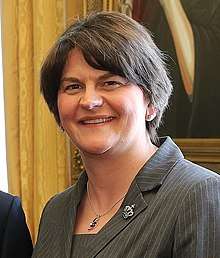
.jpg)
.jpg)
